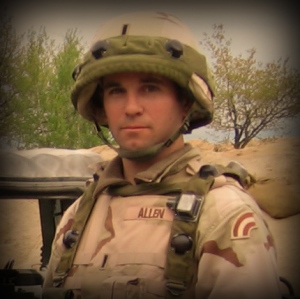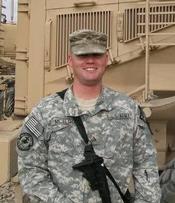This is a place for members of Home of the Brave to post thoughts, insights, and opinions about events related to the investigation of non-combat deaths of US soldiers, sailors, marines, and airmen.
Monday, June 09, 2014
Sunday, June 08, 2014
Death Anniversary

Lt. Louis Allen
My name is Barbara Allen. I am the widow of Lt Louis Allen, the high school teacher and National Guard officer who, in June 2005, was killed by fellow Guardsmen, Staff SSG Alberto Martinez.
This Memorial Day will mark 9 years since I kissed my husband for the last time. I can still remember the feeling I had as I drove away from Fort Drum. I felt as if a part of me was being ripped out, and I was filled with sheer panic that I would never see him again. Ten days later he was dead. I was 32 years old when I became a widow.
Lou and his friend Captain Phillip Esposito, Company Commander of the 42nd ID in Iraq, had worked together to arrange for Lou to join Phil at FOB Danger. Phil was filing nonjudicial punishment (an Article 15) against Martinez, dismissing him from the unit. This would result in Martinez losing not only his position in Iraq, but his stateside civilian position with the National Guard. Lou was brought in to assess the damage in supply and restore order to that division. Lou expressed to me his eagerness to help his friend and do his part by deploying in support of Operation Iraqi Freedom. This confidence was shaken upon arrival; Lou told me in a phone call that the supply mess was worse than he could have imagined, and Martinez was publicly hostile about the situation. What Lou did not know, and I cannot find peace with, is that he would be dead just 3 days after arriving on base- murdered by one of our own. While Phil knew Martinez was responsible for missing supplies, poor accountability, and gross insubordination, he did not know the extent of Martinez’s hatred for him, or the suspicious past of his supply sergeant. Phil did not know Martinez was accused of stealing from his UPS job, or setting his home on fire to collect insurance funds rather than lose his home to foreclosure. He could never imagine that people he saw on a regular basis – many of whom called him their friend- would not tell him that Martinez was openly threatening to frag him, making some of them uncomfortable enough that they began avoiding him themselves.
Martinez knew Lou’s arrival signaled his own imminent departure. He was unwilling to accept this. On the eve of June 7, 2005, he detonated a claymore mine outside Captain Esposito’s office window, killing Phil instantly and mortally wounding my husband. Just like that, I was transformed from a happily married wife to a widow facing life without my best friend and father of our four small boys. Trevor, our oldest son, was just six years old the day his dad died. I was thrust into a world I would never have believed I was capable of navigating; a homicide investigation, capital trial, military cover-ups, deceit, and betrayal.
The circumstances of Lou’s death were sketchy at best, and in the midst of trying to absorb our loss I was also attempting to discern the actual facts as opposed to the details we were being given. As I got in the car at the cemetery immediately after the services, my CAO told me an American soldier had been arrested for killing Lou and Phil. For the second time in seven days, my world was upended.
For the next 3 ½ years our families were consumed with the trial of SSG Alberto Martinez. I traveled to Kuwait for the first hearing, and our families all traveled from NY to Fort Bragg, NC, and the appellate courts in DC for countless other hearings leading up to the trial. We watched the case disintegrate as rulings against the government became the norm in the proceedings. Our rising panic was met with assurances we should trust the government. Our efforts to gain public support through media interviews were met with admonitions that we were jeopardizing the case. Inquiries on my behalf from a JAG officer to the government’s prosecution team were met with assurances that no guilty plea was being discussed — the same day, we later learned, a guilty plea had been offered by Martinez and rejected by Lt General Vines, Convening Authority, who then ordered the plea be suppressed. I did not learn of its existence until a day after Martinez was acquitted. One of my own sources gave me a copy of the plea. With this copy tucked in my bag, I confronted the commander of Fort Bragg’s 18th Airborne Division. I knew he had received his own copy, yet he looked me in the eye and denied it existed. I then made the first of what would be many moves to expose the steady lies and attempt to set the record straight – I gave the plea to the NY Times, and it made front page news. Still, nothing happened as far as the government admitting any wrong-doing.
The shock of the acquittal was soon replaced by a need to set right what the government failed to do. There is no doubt Martinez is guilty; in the military, it is mandatory that defense attorneys agree to offer enough evidence of such to the judge, to submit a plea. Rather, the military judicial system’s weaknesses combined with human error and willful misdoings – a list of which is too lengthy to include here- resulted in further pain to our families and dishonoring of my husband and Captain Esposito. To that end, I have not stopped in my efforts to clear the record, encourage the military to enact protocols that would have saved not only my husband, but the dozens of other fratricide victims since, and secure for Lou the Purple Heart he has so far been denied. The government’s reasoning for denying Lou the Purple Heart is that he was not killed by the enemy. For obvious reasons, I vehemently disagree. It is my position that any soldier who willfully inflicts or conspires to inflict death or bodily harm to a fellow soldier thus declares himself an enemy of our nation. Ironically, the murder weapon in our case emphasized this sentiment, with its inscription, “Front Toward Enemy” on the front of the mine.
I have watched in disbelief as repeated instances of fratricide continue to occur. I have researched these cases, attended one of the court martials, met with prosecutors and government experts, written a master’s thesis on them, and firmly believe all but one of these cases were, like ours, preceded with ample warning signs to have been prevented. I find myself needing to try to prevent other families from experiencing the same devastation ours has. I feel compelled to do my part to ensure the men and women of our military are not needlessly subjected to danger and are properly cared for with relation to physical and mental health issues acquired through their service. I am racing the clock on this matter, as one of my sons continues to tell me he will one day wear the uniform and serve this country.
I have received tremendous support from active duty and veteran soldiers. Two Vietnam veterans went so far as to give me their own Purple Hearts in honor of Lou. Feedback from those who read my book, Front Toward Enemy, has been inspiring and supportive. I believe I can one day hold Lou’s Purple Heart, and see his name rightfully placed alongside others who lost their lives in service to this country.
To say I loved Lou would be an understatement. To say I don’t love him still would be a lie. We are moving forward in life and have welcomed a second chance at happiness. But I still feel I owe it to my husband to set the record straight and secure for him the legacy that is rightfully his. I cannot rest until I have exhausted all avenues of seeing him awarded the Purple Heart, achieving accountability to those who have escaped such, and ensuring no other family suffers the same loss. Had situations been reversed, I know with certainty he would never stop working to do the same for me.
Barbara Allen
To contact Barbara through this website, click here.
Friday, June 06, 2014
Death Anniversary
Labels:
Death Anniversary,
Death Memorial,
McElroy,
Non-combat Death
Thursday, June 05, 2014
Death Anniversary

Col. Theodore S. Westhusing 44,
A U.S. Military Academy professor serving with the Multinational Security Transition Command-Iraq Dallas, Texas Died of non-combat related injuries in Baghdad, Iraq, on June 5, 2005.
6/1/2005. COLONEL TED WESTHUSING 44 BIAP, IRAQ GUNSHOT
I am Sullied-No More. Faced with the Iraq war’s corruption, Col. Ted Westhusing chose death before dishonor by Robert Bryce Ted Westhusing was a true believer. And that was his fatal flaw. A colonel in the U.S. Army, Westhusing had a good job teaching English at the U.S. Military Academy at West Point. He was a devout Catholic who went to church nearly every Sunday. He had a wife and three young children. He didn’t have to go to Iraq. But Westhusing was such a believer that he volunteered for what he thought was a noble cause. At West Point, Westhusing sought out people who opposed the war in an effort to change their minds. “He absolutely believed that this was a just war,” said one officer who was close to him. “He was wholly enthusiastic about this mission.” His tour of duty in Iraq was to last six months. About a month before he was to return to his family—on June 5, 2005—Westhusing was found dead in his trailer at Camp Dublin in Baghdad. At the time, he was the highest-ranking American soldier to die in Iraq. The Army’s Criminal Investigation Command report on Westhusing’s death explained it as a “perforating gunshot wound of the head and Manner of Death was suicide.” He was 44.
Like Loading...
Subscribe to:
Comments (Atom)

